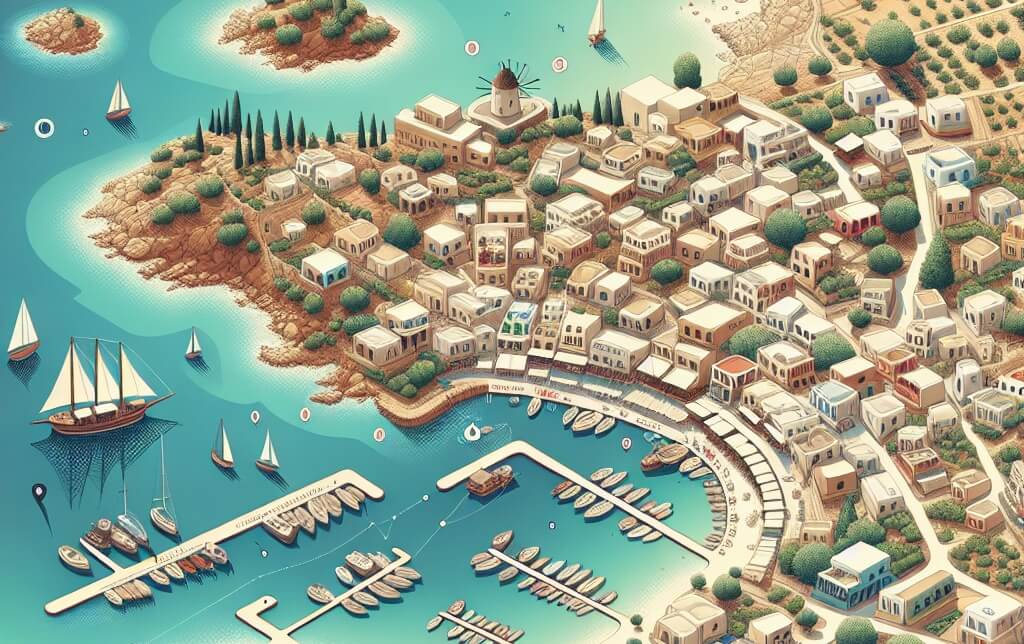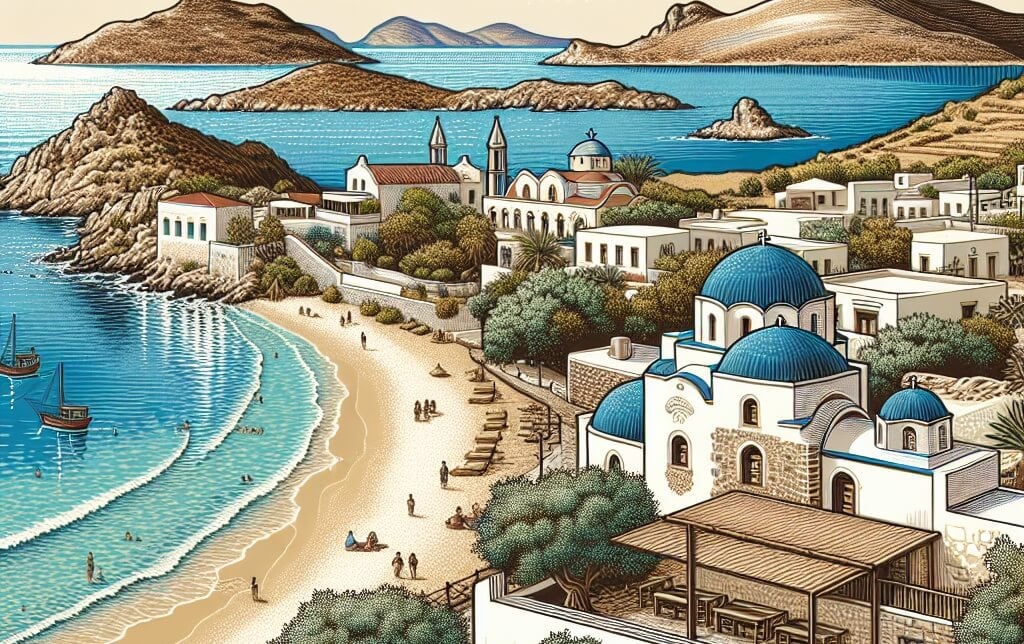
Exploring Eretria: Discover the Hidden Gems of Greece
Eretria, a charming coastal town in Greece, offers a wealth of hidden gems waiting to be discovered by intrepid travelers. Steeped in history, Eretria boasts archaeological sites dating back to ancient times, such as the ancient theater and the Temple of Apollo Daphnephoros. These historical landmarks provide a glimpse into the rich cultural heritage of the region. Additionally, Eretria's picturesque beaches, crystal-clear waters, and vibrant local markets offer a perfect blend of relaxation and exploration for visitors seeking a unique Greek experience. Whether strolling through the cobblestone streets of the old town or indulging in fresh seafood at waterfront tavernas, exploring Eretria promises an unforgettable journey through the lesser-known treasures of Greece.
Introduction
Eretria, located in Greece, holds a significant place in the historical and cultural landscape of the country. The city's rich history dates back to ancient times, with evidence of human settlement dating as far back as the Neolithic period. Eretria played a crucial role in the development of Greek civilization, particularly in trade and maritime activities. The city's strategic location on the coast of the Euboean Sea made it a prominent hub for commerce and cultural exchange. As one of the major city-states of ancient Greece, Eretria was known for its contributions to literature, philosophy, and the arts. Today, the archaeological site of Eretria stands as a testament to its illustrious past, attracting visitors from around the world to explore its ruins and learn about its fascinating history.
Historical Background
Eretria, Greece, holds a significant historical background that dates back to ancient times. As one of the oldest cities in Greece, Eretria played a crucial role in the development of Greek civilization. Founded in the 8th century BC, Eretria was a prominent city-state that thrived as a center of trade, culture, and politics. The city's strategic location on the island of Euboea allowed it to establish strong maritime connections with other Greek cities and civilizations in the Mediterranean. Eretria's prosperity was evident in its impressive architecture, including temples, theaters, and public buildings. However, the city also faced periods of conflict and decline, particularly during the Persian Wars and the Peloponnesian War. Despite these challenges, Eretria's historical significance endures as a testament to the enduring legacy of ancient Greek civilization.
Ancient City of Eretria
The Ancient City of Eretria, located in Greece, holds immense historical significance as one of the major Greek city-states during the Archaic and Classical periods. Founded around the 8th century BC, Eretria prospered as a center of trade and culture, boasting impressive architectural achievements such as temples, theaters, and public buildings. The city played a crucial role in the development of Greek civilization, contributing to the fields of philosophy, art, and politics. Despite facing various invasions and setbacks throughout its history, Eretria remained resilient and continued to thrive until its decline in the 4th century BC. Today, the ruins of this ancient city serve as a testament to its rich heritage and enduring legacy in the annals of Greek history.
Prosperity and Cultural Development
In the context of Eretria, Greece, the relationship between prosperity and cultural development is intricately intertwined. The historical significance of Eretria as a prosperous ancient city-state highlights the correlation between economic stability and the flourishing of arts, literature, and philosophy. The wealth generated from trade and commerce in Eretria allowed for the patronage of artists, thinkers, and artisans, contributing to the cultural vibrancy of the region. As prosperity increased, so did the opportunities for cultural exchange and innovation, leading to the development of a rich artistic and intellectual heritage. Thus, it can be argued that prosperity in Eretria played a vital role in fostering cultural development and shaping the identity of the city-state.
Relations with Other Greek City-States
Eretria, a prominent city-state in ancient Greece, maintained complex relations with other Greek city-states during its time. Situated strategically on the island of Euboea, Eretria engaged in both diplomatic alliances and rivalries with neighboring city-states such as Athens, Thebes, and Chalcis. These relationships were often shaped by shifting political dynamics, economic interests, and military conflicts that characterized the competitive landscape of the Greek world. While Eretria sought to secure its own interests and expand its influence through alliances and trade agreements, it also faced challenges and hostilities from rival city-states vying for power and dominance in the region. Overall, the interactions between Eretria and other Greek city-states were marked by a complex web of political maneuvering, alliances, and conflicts that reflected the competitive nature of ancient Greek society.
Eretria in the Hellenistic Period
During the Hellenistic Period, Eretria in Greece experienced a significant transformation in its political, social, and cultural landscape. As a prominent city-state, Eretria played a crucial role in the political affairs of the region, often aligning itself with larger powers such as Athens and Macedon. The city also saw a flourishing of intellectual and artistic achievements, with notable figures like the philosopher Menedemus and the sculptor Pythocritus hailing from Eretria. Additionally, the city's strategic location on the coast allowed it to thrive economically through maritime trade, contributing to its prosperity and influence in the wider Mediterranean world. Overall, Eretria's presence during the Hellenistic Period was marked by a dynamic blend of political power, cultural vibrancy, and economic prosperity.
Notable Landmarks and Structures
Eretria, Greece, boasts a rich history and is home to several notable landmarks and structures. One such landmark is the ancient theater of Eretria, dating back to the 5th century BC. This well-preserved theater provides a glimpse into the cultural and architectural achievements of the ancient Greeks. Another significant structure in Eretria is the Temple of Apollo Daphnephoros, an ancient sanctuary dedicated to the god Apollo. This temple, with its Doric columns and intricate carvings, serves as a testament to the religious practices of the ancient Eretrians. These landmarks and structures stand as enduring symbols of Eretria's historical and cultural significance.
Archaeological Discoveries
Archaeological discoveries in Eretria, Greece have provided invaluable insights into the ancient history and culture of this region. The excavation of sites in Eretria has unearthed artifacts dating back to various periods, shedding light on the city's significance in antiquity. These discoveries have not only enriched our understanding of Eretria's past but have also contributed to the broader field of archaeology. The meticulous study and preservation of these findings are essential for preserving the heritage and legacy of Eretria for future generations to appreciate and learn from.
Conclusion
In conclusion, Eritrea, Greece, holds significant historical and cultural importance due to its strategic location and rich heritage. The city's ancient roots and architectural marvels, such as the Temple of Apollo Daphnephoros and the theater of Eretria, serve as testaments to its past grandeur. Despite facing challenges and periods of decline, Eritrea continues to attract visitors and researchers alike, drawn to its fascinating blend of history and natural beauty. As efforts are made to preserve and promote the city's historical sites, Eritrea stands as a symbol of Greece's enduring legacy and the importance of safeguarding its cultural heritage for future generations.









